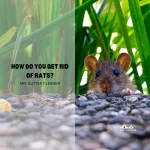Rodents are attracted to environments that provide them with necessities such as food, water, and shelter, making homes particularly vulnerable to infestations if these elements are readily available.
Access to food waste, water from leaky fixtures or poorly maintained gutters, and shelter in undisturbed areas can make a house an appealing target for these pests.
Gutters clogged with organic matter like leaves and twigs offer perfect nesting sites for rodents, highlighting the necessity of routine gutter cleaning and overall home maintenance in preventing rodent invasions.
Removing these attractants plays a crucial role in discouraging rodents from seeing a home as a suitable living space.
This summary stresses the importance of mitigating attractants and maintaining gutters to prevent rodent problems.
It sets the stage for exploring factors affecting rodent infestations and the importance of gutter maintenance in prevention.
Regular inspections of potential entry points and sealing any gaps or cracks in the structure further fortify homes against rodent intrusion, ensuring a safer and more secure living environment for occupants.
What Attracts Rodents to Your Home?
Rodents are drawn to homes for reasons that directly impact their survival: food, shelter, and water. Understanding these factors can help homeowners mitigate risks and protect their properties.
How Do Food Sources Influence Rodent Infestations?
Rodents are primarily attracted to homes with readily available food sources. Unsecured garbage bins, pet food left outside, and fruit trees near the home provide rodents with easy meals, encouraging infestations. Eliminating these food sources reduces the likelihood of rodents seeing your home as an attractive destination.
The Role of Shelter and Nesting Opportunities
Shelter is a critical factor for rodents, especially in adverse weather conditions. Cluttered areas, dense vegetation, and undisturbed materials like storage boxes offer perfect nesting sites. Regularly decluttering and maintaining the yard can significantly decrease shelter opportunities for rodents.
Water Availability and Its Impact on Rodent Presence
Like all living beings, rodents need water to survive. Sources of water, such as leaky faucets, pet water bowls left outside, or standing water from poor drainage, can attract rodents. Ensuring that your property is free from excess water sources can deter rodents from taking residence.
Poorly Maintained Gutters as a Reason for Rodent Infestations
Poorly maintained gutters provide rodents with both shelter and water. Clogged gutters can lead to standing water, which attracts rodents, while the debris offers a cozy nest. Regular gutter cleaning and maintenance are essential steps in preventing rodent infestations, highlighting the importance of home maintenance in pest control strategies. This preventative measure not only keeps your gutters functioning properly but also contributes significantly to deterring rodents from viewing your home as a suitable habitat.
Identifying Signs of a Rodent Infestation
Recognizing the early signs of a rodent infestation is crucial for homeowners to take timely action and prevent extensive damage and health risks. This section outlines the key indicators that suggest the presence of rodents in your home.
Physical Evidence of Rodents in Your Home
The most definitive signs of a rodent infestation include droppings, which are small and dark, indicating recent activity. Finding gnaw marks on furniture, walls, or food containers also signals their presence. Additionally, rodent nests made from shredded paper or fabric in secluded areas are a clear indicator.
Sounds and Noises: What to Listen For
Rodents are most active at night. Listen for unusual sounds such as scratching, scurrying, or gnawing within walls, attics, or under floors. These noises, particularly at night, often point to a rodent infestation.
Damage and Marks: Indicators of Rodent Activity
Beyond the physical signs, structural damage can also indicate an infestation. This includes holes chewed through walls or floors, damaged food packages, and frayed wires. Such damage not only signifies the presence of rodents but also poses fire hazards and structural integrity issues.
How Your Home’s Location Affects Rodent Infestations
The location of your home plays a pivotal role in the likelihood and severity of rodent infestations. Understanding these geographical factors can guide homeowners in implementing targeted prevention strategies.
Urban vs. Rural: Comparing Rodent Risks
Urban areas, with their dense populations and abundant waste, tend to attract rodents seeking food and shelter. In contrast, rural homes may face rodent issues related to surrounding vegetation and agricultural activities. Awareness of your area’s specific risks can inform more effective control measures.
Proximity to Waste Disposal Areas and Its Consequences
Homes near waste disposal sites or areas with poor sanitation practices are at increased risk of rodent infestations. Rodents are drawn to these areas for the easy access to food, and from there, they may find their way into nearby homes. Ensuring proper waste management and sanitation, both at a community and individual level, is key to reducing this risk.
Preventative Measures to Keep Rodents Away
Proactive steps in home maintenance can significantly deter rodents, ensuring your home remains safe and rodent-free. This section outlines practical measures any homeowner can implement.
Sealing Entry Points: A Step-by-Step Guide
Rodents can enter through the smallest openings. Inspect your home’s exterior for any cracks or holes, and seal them with appropriate materials like steel wool, caulk, or metal sheeting.
Pay particular attention to areas where utility pipes enter the home, as these are common entry points.
Proper Food Storage Techniques to Deter Rodents
Rodents are attracted to easily accessible food. Store food in sealed containers and avoid leaving pet food out overnight.
Regularly dispose of garbage in tightly sealed bins to minimize odors that attract rodents.
Landscaping and Outdoor Maintenance to Reduce Attractiveness
Overgrown vegetation provides shelter and nesting sites for rodents. Keep grass trimmed and bushes pruned away from your home’s foundation. Remove any debris or clutter from your yard that could offer rodents a place to hide.
Professional vs. DIY Rodent Control Methods
Choosing between professional services and DIY approaches for rodent control is crucial. Each method offers unique advantages and limitations based on the severity of the infestation and the homeowner’s capability to manage it.
When to Call a Professional Pest Control Service
Professional pest control services are recommended when the infestation is extensive, poses a health risk, or DIY methods have failed. Professionals have access to commercial-grade tools and strategies that are more effective and quicker in addressing severe infestations. They can also provide tailored solutions that consider your home’s specific vulnerabilities.
Effective DIY Solutions for Rodent Control
For minor infestations, DIY methods can be both cost-effective and efficient. These include setting traps, using natural repellents like peppermint oil, and maintaining cleanliness to deter rodents. Homeowners can seal small entry points with steel wool or caulk to prevent rodents from entering. Regular inspection and immediate action upon signs of rodent activity are crucial in DIY rodent control.
Understanding the Health Risks Associated with Rodents
Recognizing the health risks associated with rodent infestations is critical for homeowners to take prompt and effective action. Rodents are not merely a nuisance but can pose serious health threats to humans.
Diseases Transmitted by Rodents to Humans
Rodents are known carriers of various diseases, such as Hantavirus, Leptospirosis, and Salmonellosis, which can be transmitted to humans directly through contact with rodent urine, feces, saliva, or indirectly through ticks, mites, or fleas that have fed on an infected rodent. These diseases can lead to severe health issues, emphasizing the importance of preventing and controlling rodent populations in and around the home.
The Importance of Prompt Removal and Sanitation
Prompt removal and sanitation efforts are crucial once a rodent infestation is identified. Proper cleanup of rodent-contaminated areas using appropriate protective gear and disinfectants can help minimize health risks. Regularly disinfecting potential entry points and maintaining cleanliness can deter future infestations, safeguarding your home from the health hazards rodents present.


